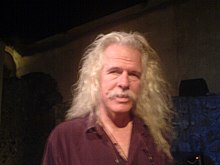Biography
Music is the language of my dialogue with that which I perceive to be sacred.
Ross Daly has traveled the world, mainly in the Middle East, Central Asia, and the Indian subcontinent, studying various forms of local music traditions.
In 1982, he established an educational institution called Labyrinth Musical Workshop, [2] in the village of Houdetsi, Crete, twenty kilometers south of the capital city of Herakleion. More than 250 instruments that Daly collected during his travels are displayed.
Since 2002, the Labyrinth Musical Workshop hosts seminars and "master classes" with teachers of traditional music from around the world, attracting students from around the world. Labyrinth Musical Workshop was founded to initiate, mainly young people, a creative approach to traditional musical idioms from various parts of the world.
In 1990, Daly designed a new type of Cretan lyra that incorporates elements of raki, the byzantine lyra, and the Indian sarangi. The result was a lyra with three playing strings of 29 cm in length (the same as the standard Cretan lyra), and 18 sympathetic strings which resonate on Indian-styled jawari bridges (the number of sympathetic strings was later increased to 22).
Daly has released more than 35 albums of his compositions and of his own arrangements of traditional melodies collected during his travels.
In the Summer of 2004, he was the artistic director of the cultural program of the Olympic Games for the Olympic city of Heraklion on the island of Crete, titled "Crete, Music Crossroads". He organized and artistically supervised 15 concerts with the participation of 300 musicians from all over the world, including Jordi Savall, Eduardo Niebla, Huun Huur Tu, Habil Aliyev, Dhoad Gypsies of Rajasthan, Mohammad Rahim Khushnawaz, Chemirani Trio, Adel Selameh.
Ross Daly is the originator of the term Contemporary Modal Music, which refers to contemporary compositional works which draw their influences and inspiration from the broader world of Modal musical traditions which are found primarily (although not exclusively) in the vast geographical region between Western Africa and Western China. Composers of Contemporary Modal Music initially study intensively various of these traditions and subsequently compose new works in which they freely integrate influences and elements from these idioms into their work. The Musical Workshop Labyrinth, of which Ross Daly is the founder and artistic director, has been very active in promoting and supporting this type of composition as it crosses ethnic and other lines as well as stressing contemporary creative work in musical idioms which are usually considered to be "traditional" and therefore with their "creative center" in the past. Ross Daly himself disputes this notion, believing instead that the epithet "traditional" implies above all an element of timelessness in which the contributions of the past, present, and future are equally important and relevant to the creative process.
In the European Elections of 2009, he was the candidate with the Ecologists Greens.
This page is based on this
Wikipedia article Text is available under the
CC BY-SA 4.0 license; additional terms may apply.
Images, videos and audio are available under their respective licenses.

